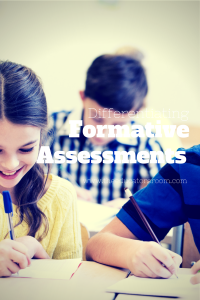 The point of teaching is to learn. Each student comes to us with different experiences and this impacts how and when they master the various concepts and skills presented in the classroom. Part of teaching is understanding where students are in a lesson, skill, and unit. Exit tickets have become the buzz, but there are many ways, beyond a ticket out, to check for understanding during your teaching.
The point of teaching is to learn. Each student comes to us with different experiences and this impacts how and when they master the various concepts and skills presented in the classroom. Part of teaching is understanding where students are in a lesson, skill, and unit. Exit tickets have become the buzz, but there are many ways, beyond a ticket out, to check for understanding during your teaching.
Creativity: Allow students to express their knowledge of the concept or idea in a creative way, through art. Some of these activities can be done quickly, others will take a little more time; but they will represent what your students have taken away from the content and lesson you are teaching.
1.Write a poem about the topic/subject
2.Draw a picture of the main idea
3.Create an icon to represent the information
4.Draw a map
5.Make a collage
6.Make a 3D model
7.Create a word cloud
8.Make a poster
9.Design a postcard (then write a letter to someone about the subject on the back)
Writing: Teachers have been asking students to journal and write reflections for eons. Use short and long writing prompts to allow students to explain their thinking and show their knowledge and understanding of a unit. Use their work to guide the next step in your classroom.
1.Write a summary
2.Write a notecard that could be used for a speech
3.Write a tweet
4.Make a table of contents about the subject listing the main ideas in chapter format
5.Create a glossary with important vocabulary words
6.Write interview questions for an expert on the subject
7.Write an obvious question about this subject, write a thought-provoking question about this subject and write a question that has no answer on this subject
Technology: There are many resources today available for quick formative assessments. You can use these resources to quiz your students and then have immediate data available. Using iPads, tablets, smart phones and computers, classrooms have access to “clickers” and can gather data in minutes.
1.Socrative is a smart student response system that empowers teachers by engaging their classrooms with a series of educational exercises and games. The apps are super simple and take seconds to login. Socrative runs on tablets, smartphones, and laptops. ENGAGING.*
2.Geddit is a new web-based app for the 1:1 classroom that lets students give instant feedback about their understanding. This information is visible in real-time so that teachers can identify needs as they occur, allowing for quick and easy differentiation.
3.Kahoot is a classroom response system which creates an engaging learning space, through a game-based digital pedagogy.
4.Google Forms is a free Web-based application in which document s and spreadsheets can be created, edited and stored online. Files can be accessed from any computer with an Internet connection and a full-featured Web browser. You can create surveys, polls, quizzes or collect information. To learn more check out this article.
Teachers are constantly observing and making decisions in the classroom. There are things you can do, however, to provide you with evidence of how your students are learning as the lessons and unit progresses. Gone is the day of checking for understanding at the end. To help students find success in this summative assessment, gather formative data along the way. This will allow you to adapt your lessons, make cooperative groups, and use your time focusing on what your students need. Gathering this information should occur within lessons. It allows your pacing to match what students need. Formative assessments show you where to form your next lesson. Use the ideas above or for more ideas about gathering information about student learning check out this link. What is your go to way to gather information about your teaching?




